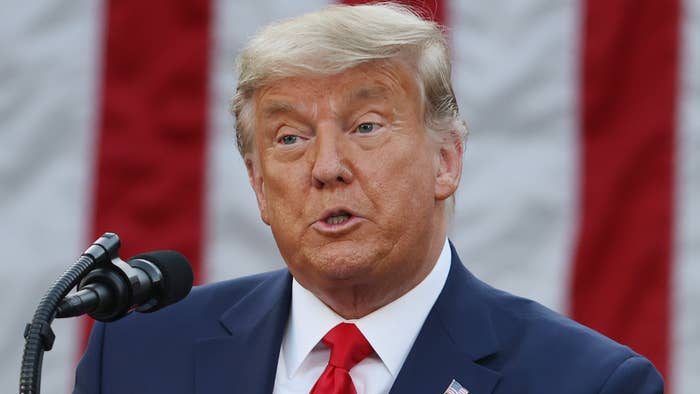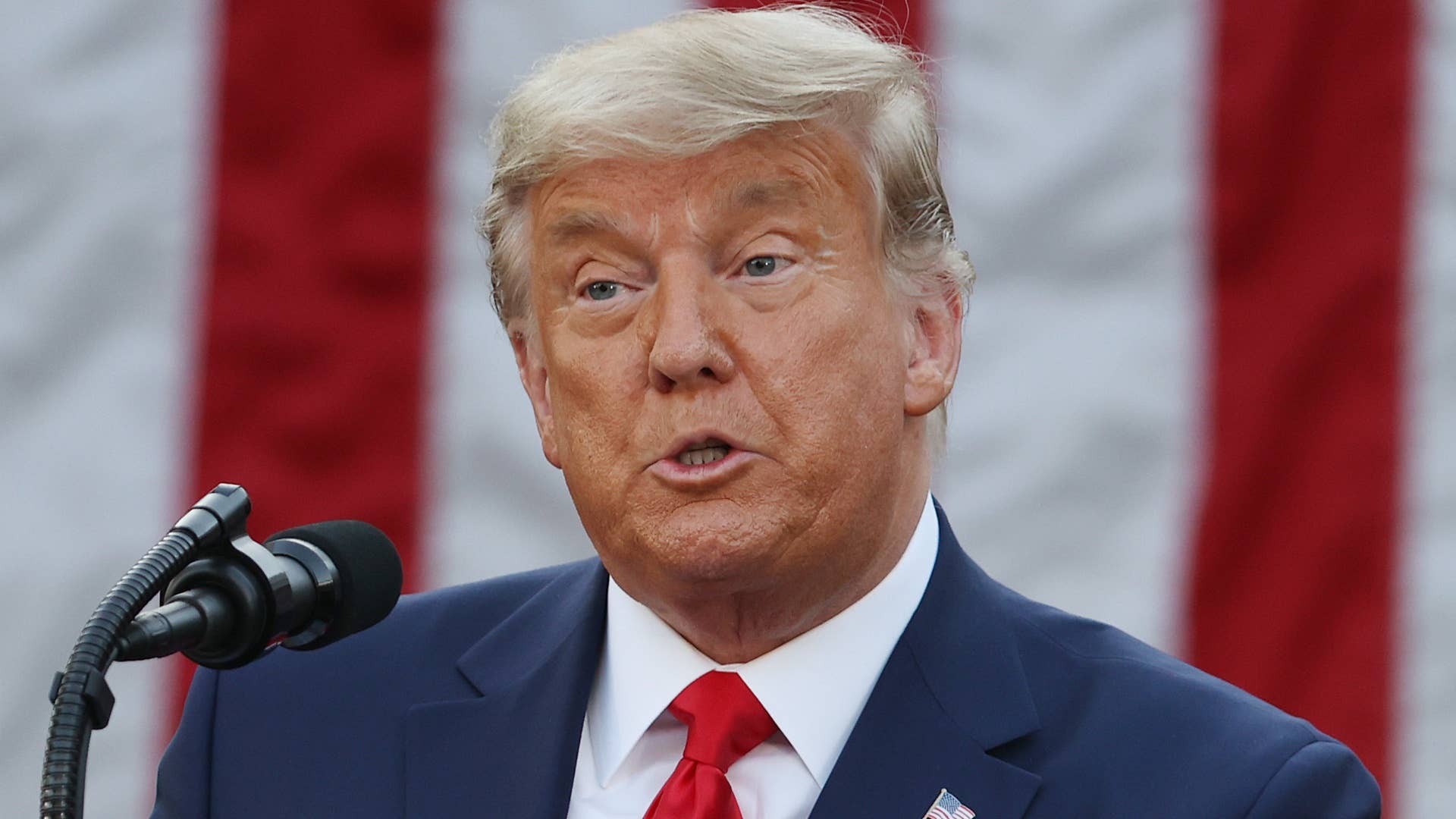
As Donald Trump approaches his last days in the White House after losing the 2020 presidential election to former VP Joe Biden, a veritable smorgasbord of fourth-quarter concerns are receiving renewed public interest.
Chief among these, of course, is how the current administration will handle (or mishandle) the litany of continued COVID-19 pandemic issues that have come to define 2020. In lieu of any encouraging news on that front at the Trump administration level, much of the What the F*ck Else Does This Year Have Planned for Us? discourse has recently zeroed in on what we can expect with regards to Trump's pardons.
Frequently debated during Trump's presidency, the core question many have given attention to is whether the former Apprentice host can actually pardon himself.
Below, we take a closer look at how possible that scenario is, as well as a few examples of who else could potentially stand to benefit from a Trump pardon.
Way back in June of 2018, which somehow feels hundreds of years in the past, Trump claimed "numerous legal scholars" had backed up his belief that he has "the absolute right" to pardon himself. At the time, however, Trump also conceded that doing so could be viewed as a guilt admission.
"Why would I do that when I have done nothing wrong?" he asked before lamenting Robert Mueller's Russia-related probe.
More recently, of course, Trump's tweets have largely centered on his repeated claims—without evidence—of so-called voter fraud in the 2020 election. A recent CNN report citing current and former administration officials, however, claimed that Trump has been asking aides "since 2017" about pardoning himself. Additionally, according to a former White House official, Trump has asked about pardoning members of his family and pardoning other allies in a preemptive nature for federal crimes that could result in future charges.
Per the Constitution, only federal crime convictions can be pardoned by the president. And while a president isn't able to pardon a state criminal offense, the power of the pardon does extend to include convictions adjudicated in the Superior Court of the District of Columbia.
The federal crimes distinction is particularly notable for Trump, as it means his pardons wouldn't help in instances like the Manhattan district attorney and New York attorney general's investigation of the Trump Organization.
Unlike a commutation, which sustains a conviction but targets the sentence, a pardon—though its powers are not constructed to be absolute—also scrubs the conviction itself.
While a pardon from Trump for the usual close associates—including members of his own family—is a legally supported possibility, there is much debate over the issue of a self-pardon.
Many argue, per a recent breakdown from the Hill's Jeffrey Crouch, that a self-pardon means the president would essentially be "serving as a judge in one's own case." Put another way—and Trump himself has expressed this same interpretation in the past—a self-pardon could be viewed as an admission of guilt.
Still, it's not entirely clear who would be tasked with putting up a challenge to a president's self-pardon.
Way back in 1974, a memo from the Justice Department—released during the Watergate era—cited the "judge in his own case" assessment while adding the more definitive interpretation that a president "cannot pardon himself." However, the president could use the 25th Amendment to make a VP the acting POTUS. From there, the acting POTUS would be able pardon the president.
Following Richard Nixon's resignation in 1974, for example, Gerald Ford—the 40th VP of the U.S.—took on the presidency. He subsequently pardoned Nixon, arguing that the move was a gesture of peace for the nation and effectively served as an admission of guilt from Nixon.
So, yes, the widely held take here is that Trump could at least attempt a self-pardon. What would happen in response to that move isn't clear, though the key criticism is that a self-pardon is arguably a betrayal of the Constitution in a larger sense.
In short, yes. However, the pardon—as mentioned above—wouldn't protect Trump from any possible prosecution problems at the state level.
But when asked earlier this year to "commit" to not going full Gerald Ford by pardoning Trump for possible crimes, Biden agreed.
"I commit," Biden said in May during an MSNBC appearance. Biden also vowed to not interfere with any Trump-centered investigations, as doing so is "not something the president is entitled to do."
Biden suddenly reversing his stance on any of this is highly unlikely, though plenty of op-eds have popped up in recent weeks arguing that the former VP should reconsider his stance by looking at a pardon as a peace offering of sorts for a deeply divided country.
Democrats have consistently sounded the alarm on Trump's approach to clemency, particularly in responses to instances like the commutation of Roger Stone's sentence earlier this year.
"With Trump there are now two systems of justice in America: One for Trump's criminal friends and one for everyone else," Rep. Adam Schiff of California said back in July.
As for pardons, there have been examples of widely supported recipients during Trump's single term including Alice Marie Johnson, whose campaign for release received renewed attention in 2018 thanks in part to Kim Kardashian.
A more typically Trumpian example, of course, is the 2017 pardon of former Maricopa County sheriff Joe Arpaio.
In total, Trump has given pardons to 27 people during his sole term as president. Among the other pardon recipients are former NYPD commissioner Bernard Bailey Kerik, Republican ex-lawyer David Safavian, U.S. Army officer Mathew Golsteyn, and more. Golsteyn had been charged with murder for killing a civilian in Marjah, Afghanistan.
Amid the Russia investigation in 2018, a poll from the Associated Press-NORC Center for Public Affairs Research found that 85 percent of Americans believe it would be unacceptable for any president to pardon themselves if charged with a crime. When broken down by party, the poll showed that—at least at that time—an estimated three-quarters of polled Republicans said a president should not pardon themselves if charged.
And while Republican Senator Mitt Romney hasn't specifically entertained the idea of Trump pardoning himself, he was quick to point out the "historic corruption" present in Trump's decision to provide Roger Stone with commutation. Romney, of course, has disappointed Democrats in the past with incongruent acts of Trump support. But it's hard to imagine Romney not being against a Trump self-pardon, whether or not Republican leaders at large agree.
Meanwhile, any efforts aimed at challenging a self-pardon attempt could potentially land in the hands of the Supreme Court. With a trio of Trump-nominated justices and several other Republicans, could the Supreme Court realistically be expected to get in Trump's way?


